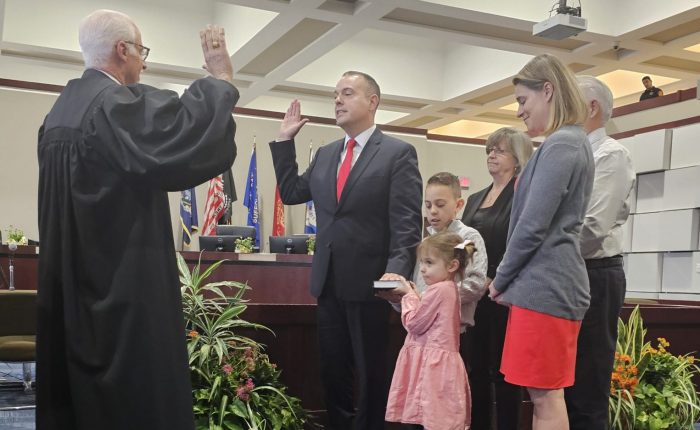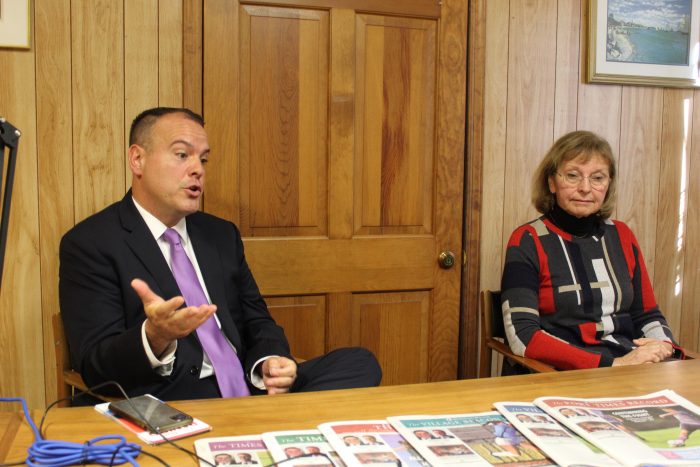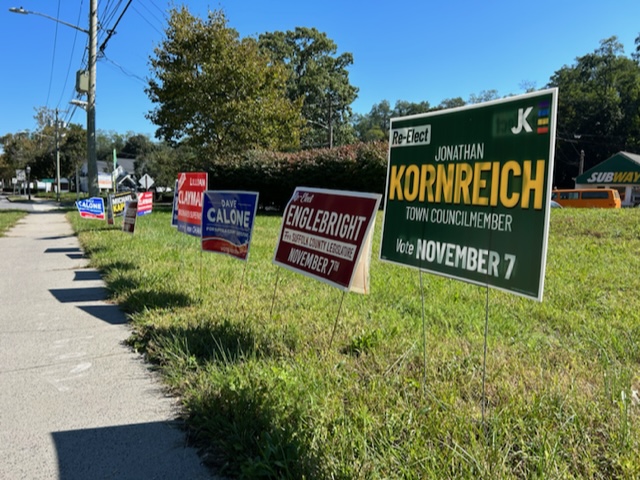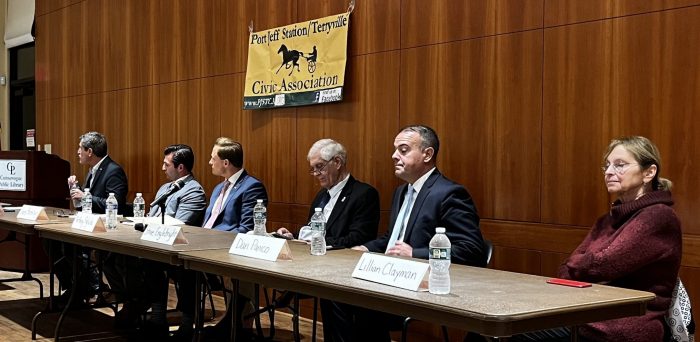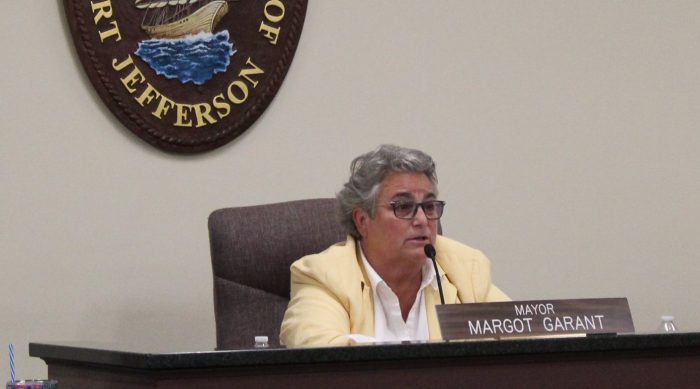By Lynn Hallarman
A lively debate took place between candidates Lillian Clayman (D) and Dan Panico (R) for Town of Brookhaven supervisor at the headquarters of TBR News Media. The incumbent supervisor, Ed Romaine (R), is running for Suffolk County executive.
Candidates had two minutes each to respond to questions from the staff, with an optional 30-second rebuttal. The debate kicked off with the rundown of their credentials.
Clayman, 70, of Port Jefferson, honed her political skills as the three-term elected mayor of Hamden, Connecticut, from 1991 to ’97. She served as a city councilwoman in Connecticut, where she was the finance committee chair and managed a budget of about $200 million. Clayman noted that she spent 10 years as a financial planner and portfolio manager.
Since moving to Long Island 20 years ago, she has worked as a union organizer for 1199 SEIU (Service Employees International Union) and was chair of the Brookhaven Town Democratic Committee from 2016 to ’21. She holds a doctoral degree in American History from Rutgers in 2019.
Clayman was asked to step in when former Village of Port Jefferson Mayor Margot Garant withdrew from the race this June due to illness.
“As mayor of Hamden, I was in charge of the board of education budget, the sewers, the police department, the fire department, the libraries, all the roads, parks and recreation,” she said.
Panico, 45, of Center Moriches, represents the town’s 6th Council District, a position he has held since he was first elected in 2010.
Panico received his law degree from Touro Law School with an award for excellence in land use, zoning and planning. He has been deputy supervisor of the Town of Brookhaven since 2012.
“I’ve run as high as almost 79% of the vote because I know the job I do, and that is local government,” he said. “I don’t talk about national politics.”
Town supervisor’s role
When asked for their superpower, or the quality that makes them most qualified for the town’s highest post, the candidates offered varying perspectives.
Panico said, “My superpower is that my land use planning and zoning ability is unparalleled by anybody in the town. That is my superpower.”
Clayman, on the other hand, responded, “I can get people to work together. I work collaboratively.”
Land use
Panico said he believes the best land use decisions happen at the hyperlocal level in collaboration with communities and their elected district council representative.
“I’m deeply involved in all the redevelopment projects throughout the entire town,” the deputy supervisor said. “It’s without an exaggeration that I could be the councilperson for any of the six town council districts.”
He added, “I have the know-how to meet with developers and push the projects through, which are predominantly redevelopment, but also safeguard communities like Stony Brook and Setauket to make sure they are not overdeveloped.”
Clayman used her two minutes to focus on sewer infrastructure, which she believes is a critical aspect of sustainable development throughout the town.
“Without sewers, without IA [Innovative/Alternative] septic systems, we will continue to release nitrogen into our aquifers into our waterways,” she said. “Until we get new sewers and septics, we can’t even talk about development. We must be very careful because we are above our capacity.”
On the Town Board’s role in overseeing the planning and construction of new developments, both candidates agreed upon a hands-on approach from the supervisor’s office.
“I make it my business to know what’s going on across the entire town, although I represent the 6th town Council District,” Panico said. “I wrote the multifamily code with our planning department. I rewrote the [Planned Retirement Community code] and the [Commercial Redevelopment District code].”
Clayman offered a slightly varied perspective, noting the role of the town government in limiting overdevelopment. “The primary function of the Town Board is to make sure that areas are not overdeveloped,” she said. “All you have to do is look at Port Jefferson Station — there is an enormous amount of overdevelopment that is occurring in this area.”
Open space
Another critical component of the town’s land use arsenal is its open space fund. When pressed for their strategies for preserving open space, Panico highlighted the few undeveloped parcels that remain.
“I think we’re in a race to save what’s left,” the Republican said. “That’s what I believe, and I believe people in Brookhaven value open space,” adding, “We have the Joseph Macchia [Environmental Preservation] Capital Reserve Fund, open space funds that we use. I would certainly partner to preserve as much open space as we can and work with our villages.”
Clayman advocated for a grassroots, civic approach targeting parcels for preservation as open space. “Working with the civic associations and the Town Board to make sure that we have open space” would be critical, the Democratic candidate said. “We don’t need to develop every single piece of property that is available. That is something that occurred during the ’70s and ’80s, and we don’t need to do that now.”
Lawrence Aviation site
Lawrence Aviation is among the biggest Superfund sites on Long Island, and both Port Jefferson Station and the Village and Port Jefferson Station will likely bear most of the impacts from future redevelopment of that site.
On how to accommodate residents of those areas, Panico said, “People have had to deal with that pollution for quite some time. If you are going to unveil solar in the area, give the affected population a reduced rate on their electric — you’re allowed to do that under New York State law. And give the residents of [Port Jefferson] Village a break on their tax bills. I think that would be a somewhat equitable thing to do.”
Clayman said that the longstanding environmental impacts are not localized to Lawrence Aviation. “It’s not just Lawrence Aviation. At the town landfill, there are negative impacts from toxins that have seeped into our groundwater and our air. People swear that Lawrence Aviation has had a negative impact [on their health]. But I also think that what Dan said is a good idea for that property. I’m all for [tax breaks].”
Cost of living
For many seniors and young people throughout the region, the high standard of living is becoming untenable, prompting many to leave Long Island. To counteract these movements, Clayman advocated for increasing the amount of affordable housing units in the town. She pointed out that to live on the Island for a family of four, you need to make about $150,000 a year.
“That’s a lot of money,” she said. “The average family on Long Island is currently making about $86,000 a year. [Affordable] housing prices need to reflect that amount. That is something that can be part of any kind of development plan.”
Panico highlighted the town’s recent efforts in constructing new affordable units. “We’ve been very successful around the town in creating more units,” he said. “But if you listen to my opponent, we can’t build any more units. And to me, I live in reality, and I am pragmatic.”
He added, “I know that there needs to be redevelopment — redevelopment is the name of the game.”
Fentanyl crisis
Both candidates regarded the fentanyl crisis foremost as a mental health issue. Panico viewed the crisis as an issue that primarily needs addressing at the state and federal levels. Clayman, on the other hand, said there is an opportunity for expanded town, county and state partnerships in education and outreach.
“We can utilize the resources that we have with Channel 18 to have outreach to the communities and to the schools,” Panico said, “But ultimately, [combating the crisis] is going to come from a change in our federal government.”
Clayman outlined her more local outlook toward remediating the challenges. “I think the town has an important role to play,” she said. The town “needs to put more of our time and energy and focus not just into development projects but also look at how we can be of service to the community.”
As a follow-up, the TBR staff inquired how the candidates sought to finance an expanded role in combating the fentanyl crisis within the town.
Clayman suggested looking within the current budget as a possible source of financing a community response to the crisis: “I would look through vendor contracts, for example, and examine [the spending on] those vendor contracts.”
Panico objected to this proposal. “We’re going to look into vendor contracts and solve the fentanyl crisis?” he asked. “To me, it doesn’t make any sense. The fact of the matter is, it’s better when one level of government is focused on this issue.”
Energy costs
Both candidates agreed that the town’s Community Choice Aggregation program, launched in Brookhaven in 2022, is a well-intentioned initiative by the Town Board.
Clayman, however, questioned the rollout of the program as mired in confusing bureaucracy, putting the responsibility on town residents to figure out how to maximize cost savings.
“While maybe it was good intentioned, it doesn’t serve the residents,” she said. “And worst of all, nobody knows about it.”
Panico acknowledged that the town could do a better job of explaining the program to residents but believes it is a worthwhile endeavor nonetheless.
“Our aim is to save people money,” he indicated. “If you are a savvy consumer, you can opt out when the price is low and opt back into our program and save real money.”
“That’s unfair,” Clayman responded. “The program is based on putting the responsibility on [residents] to opt out of a program they are automatically enrolled in. As a consumer, I would much rather learn about a program beforehand and then make a decision as to whether or not I want to participate.”
Panico countered by adding, “Scores of people have used the program, and the town has an active outreach program to educate residents on their choices. The town publishes National Grid rates on their website so that people can track the rates.”
Brookhaven animal shelter
Earlier this year, residents publicly witnessed some frayed relations between volunteers and staff at the town-operated animal shelter on Horseblock Road. [See story, “Volunteers and officials express concerns over Brookhaven animal shelter,” Aug. 5, TBR News Media.]
“Just this morning, [New York] State declared the animal shelter unsatisfactory,” Clayman said. “The volunteers at the animal shelter were [the ones] that brought [the issues] to the public eye. This is one of the areas that Brookhaven needs to be more transparent.”
She added, “An attorney was hired to oversee the animal shelter — you don’t need an attorney to be in charge of an animal shelter. He directed that the volunteers had to sign non-disclosure agreements.”
Panico defended the administration for its handling of the shelter and pointed to progress at the facility since the initial dispute.
“We hired, for the first time, a full-time veterinarian at the animal shelter,” he said. “I met with some of the more prominent volunteers — they’re happy with the progress. We are making a big effort to bring up the animal shelter. But also, we hired somebody specifically for social media to get these dogs and cats adopted.”
Clayman responded, “But it is indicative of the way the town government has been run that volunteers have to meet in secret with a potential candidate for office.”
Panico countered, “Under my administration, there will be no NDAs or anything like that. We’re going to calm the waters.”
Active-use trails
Both candidates endorsed park preservation, linear park expansion and linkage of existing trails within the town.
Panico pointed to his record as councilman in park preservation, including negotiating with developers to preserve or create park spaces.
“Our parks and trails are absolutely beautiful in the Town of Brookhaven,” he stated. “I’ve made it [almost] through the Rails to Trails with myself and my 4-year-old on the back of my bike and my 9-year-old [on his bike].”
Clayman touted her record as the mayor of Hamden in building new biking and walking amenities.
“I built the Farmington Canal trail, which is a rails-to-trail linear park,” she said. “I would work very hard in linking [Brookhaven trails] up and to build more.”
Self-reflection
TBR asked each candidate on a personal level for their greatest frustration in their respective professional lives.
“I sometimes wonder if other people spend as much time [as I do] kicking themselves in the butt over something that I thought that I should do better,” Clayman said.
For Panico, “I wrestle with whether I should stick to what I know and stay in my lane in town government, or should I get more involved in other levels of government,” he said. “Professionally, I wrestle with this issue. I’ve chosen to stick predominantly with staying in my lane. I think I’ve made the right decision.”
When asked if they had a magic wand that could immediately resolve two issues within the town, the town supervisor candidates offered insightful perspectives.
“That’s easy,” Clayman said. “I would clean up the water, I would clean up the aquifer — that would be number one. I would make sure that the air was good to breathe. That would be wonderful if I could do that.”
Panico replied, “If I had a magic wand, I would help homeless people and the mental health crisis on the Island because it’s a Herculean task, but I would if I could solve that. Litter is something that is pervasive on the Island. It’s almost societal, and there’s no easy way to tackle it.”
Residents townwide will decide between these two candidates. Election Day is Tuesday, Nov. 7.

